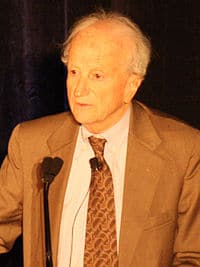
Becker was awarded the Nobel Prize in Economics (1992) for “having extended the domain of microeconomic analysis to a wide range of human behaviour and interaction, including nonmarket behaviour”
Becker’s work was influential in later ‘pop economics’ – economists who analysed all aspects of modern life and evaluated it from an economic perspective. These include books such as Freakonomics, The Armchair Economist and The Undercover Economist.
Associated with
- Chicago school of economics
- Free market economics
- Micro-economic analysis.
“What I have always learned to be the Chicago view, and taught to be the Chicago view, is that free markets do a good job. They are not perfect, but governments do a worse job. Again, in some cases we need government. It is not an anarchistic position. But in general governments do a worse job. I haven’t seen any reason to change that other than, yes, we’ve seen another example where free markets didn’t do a good job: they did a bad job. But to me there is no evidence the government did a good job either, leading up to or during the process.”
– Gary Becker, New Yorker
Studied
- Princeton University in B.A. at 1951,
- University of Chicago Ph.D. with thesis “The Economics of Racial Discrimination” (1955)
Taught
- University of Chicago (1968–2014)
- Columbia University (1957–1968)
Major contributions
Economics of racial discrimination – Becker analysed how racial discrimination hurt not just those who were discriminated against but also cost employers who paid a premium to employ workers of a certain race. Becker argued that over a long period of time, competitive markets would play a role in diminishing racial discrimination because of the profit motive to employ cheaper workers who experienced discrimination.
Crime – Becker analysed crime from the perspective of utility maximisation. Becker claimed that many criminals took a rational decision to commit crime because the payout was greater than the cost of crime. Becker claimed the implication of this result was tougher sentences for criminals and increasing the chance of catching criminal activities.
Birth rate – In 1960, Becker wrote an influential paper seeking to explain birth rates from an economic perspective. He argued birth rates were influenced by usual economic concepts of the utility and cost of children to parents. In particular, he observed a quantity versus quality tradeoff in fertility choice. For example, if a family have just one child, then they can afford to hire private tutors and get the best education and opportunities for that child. However, if a modest family were to have three of four children, their resources would be spread more thinly and they wouldn’t be able to afford private education. So the quality of the child would decline. This can explain why despite rising affluence, many parents were wanting to have low numbers of children to give them the best possible start.
Rotten kid theory. This was groundbreaking analysis into the influence of economics on family behaviour. Becker’s hypothesis claimed that in certain circumstances, selfish/badly behaved children would behave in a kind way to fellow family members in order to maximise their financial gains from their parents.
Human Capital. Becker produced work which emphasised the importance of human capital. In his work “Human Capital” (1964) he explained human capital is determined by education, training, medical treatment, and is effectively a means of production.Human capital is also important for influencing rates of economic growth.
Free Market organ donation. An example of Becker’s overview is the idea a free market could be used to overcome donar shortages in the market for organ donations. “Introducing Incentives in the market for Live and Cadaveric Organ Donations” Summer 2007
Becker argued many types of behaviour were rational and utility maximising
Quotes by Gary Becker
“Milton Friedman was] the dominant member of the so-called Chicago school of economics [during his tenure at Chicago]… The economics department increasingly reflected his approach and interests. These included deep commitment to the truth, appreciation of markets and free enterprise, frank and blunt discussion, and enormous zeal to convince the heathen. But most important was the commitment to economic analysis as a powerful instrument for interpreting economic and social life.”
- Gary Becker (1991). “Milton Friedman.”
On unconventional approaches to economics
“My whole philosophy has been to be conventional in things such as dress and so on. But when it comes to ideas, I’ll be willing to stick my neck out: I can take criticism if I think I’m right.”
On the limits of money in economic decisions
“You’re absolutely right. People have completely misunderstood, probably never read anything I wrote. Obviously money is important, but what I mostly study is non-monetary – discrimination, marriage. Nowhere in anything I’ve ever written does it say that people get married mainly or solely for money.”
Interview with Gary Becker at FT
On the morality of capital punishment
“A powerful argument for reserving capital punishment for murders is “marginal deterrence.” If assault were punished with execution, perpetrators would have an incentive to kill their victims to avoid discovery (which is a major reason why the severity of punishments more generally should be matched to the severity of crimes).”
Morality of capital punishment
On flexible labour markets
“Silicon Valley’s labor market flexibility indicates that nations that want to encourage high tech clusters should make it easy to hire and lay off workers rather than mandate substantial severance pay, or legislate limits on working hours. Companies have stronger incentives to hire added workers when they are formed or expand if they can reduce employment when demand turns down.”
Related

helping money for poor children’s of lerning education cost